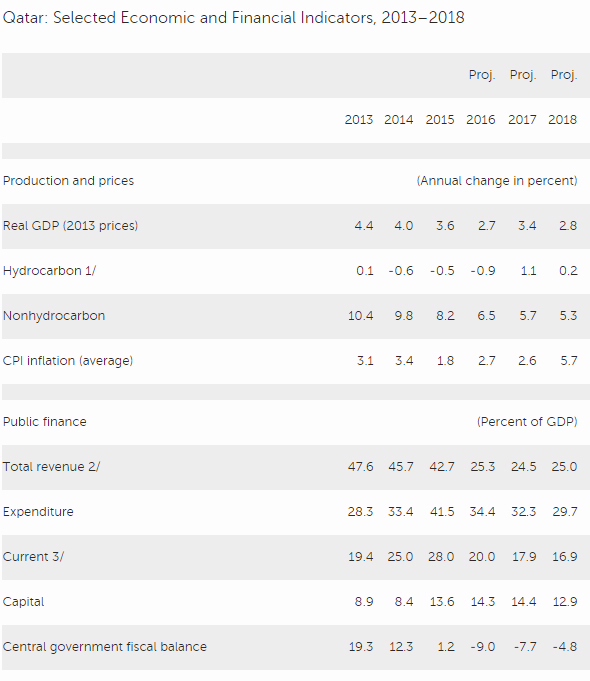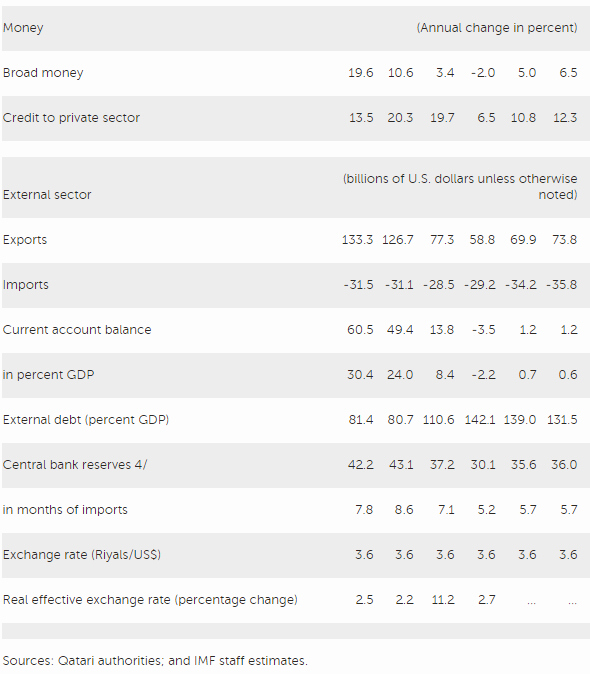IMF Executive Board Concludes 2016 Article IV Consultation with Qatar
On March 20, 2017, the Executive Board of the International Monetary Fund (IMF) concluded the Article IV consultation with Qatar.
Qatar has been implementing an ambitious diversification strategy, while strengthening its policy framework.
Lower hydrocarbon prices have adversely impacted macroeconomic performance. Growth has slowed despite still resilient non-hydrocarbon activity. Real GDP growth of 2.7 percent is estimated for 2016. Inflation remained low despite subsidy cuts, averaging about 2.7 percent in 2016. Fiscal and external balances have deteriorated from large surpluses to deficits due to sustained lower energy prices. The authorities are adjusting by cutting current expenditures in 2016, undertaking energy pricing and labor reforms, and placing stronger emphasis on raising non-hydrocarbon revenues. While banking system liquidity has tightened and credit to the private sector has moderated, banks remain sound and well capitalized.
Macroeconomic performance is expected to remain resilient under the baseline. Real GDP growth is projected at 3.4 percent for 2017, reflecting still significant expansion in the non-hydrocarbon sector owing to public investment commitments, and supported by the added output from the new Barzan gas project. Growth is expected to slow in the medium term, as public investment growth tapers off and hydrocarbon output continues to slow down. Further subsidy cuts, a moderate recovery in global commodity prices, and the introduction of a VAT are expected to improve the fiscal and external balancesgradually over the near to medium term. The main risks relate to the possibility of lower hydrocarbon prices compared to the baseline and to weaker expenditure efficiency and/or inflationary pressures from the large public investment program.
Executive Board Assessment
Executive Directors noted the macroeconomic challenges brought by sustained lower hydrocarbon prices, but agreed that Qatar is well positioned to mitigate them given its substantial financial buffers. Directors welcomed the authorities’ responsiveness to adjust to lower energy prices, and encouraged them to sustain their sound policies, which will help strengthen the fiscal position, maintain financial stability, and promote more diversified and sustainable growth.
Directors agreed that gradual fiscal consolidation over the medium term is key to ensuring the intergenerational equity of Qatar’s exhaustible hydrocarbon wealth. They supported ongoing and envisaged revenue and expenditure measures, including subsidy reforms, containment of public-service benefits, lower spending on goods and services, and the introduction of a VAT and excise taxes. Directors agreed that additional revenue measures, including broadening the base of existing taxes, particularly for the corporate income tax, should be explored over the medium term to mobilize sufficient resources for the implementation of the second national development strategy while supporting further consolidation.
Directors commended the ongoing fiscal-structural reforms, particularly the progress being made in preparing a medium-term fiscal strategy and the introduction of a new tender law and public finance law. They encouraged further efforts to enhance the monitoring of public expenditures to improve efficiency and management of investment spending, as well as further improving transparency to facilitate a more robust assessment of the fiscal position.
Directors concurred that Qatar’s fixed exchange rate regime remains appropriate. They noted that further strengthening the monetary policy framework as well as deepening domestic financial markets, particularly the domestic debt market, will prove helpful as the economy diversifies.
Directors agreed that banks remain sound and well capitalized, but noted that they could face risks from sustained low hydrocarbon prices or increasing interest rates. Noting the impact of government financing on banks, they recommended developing a more active liquidity forecasting framework. Directors welcomed the progress made with the implementation of Basel III and macro-prudential regulations, the elaboration of the new Strategic Plan for Financial Regulation, and the development of an early warning system. They also supported the efforts to enhance the framework for anti-money laundering and combating the financing of terrorism.
Directors supported the authorities’ efforts to enhance economic diversification and promote private sector development. They encouraged additional measures to further improve the business environment, and noted that labor market and education reforms will help raise productivity, increase potential output, and support inclusive growth. Directors welcomed the improvements in economic statistics, and underscored that further efforts are needed to address remaining gaps.


1/ Includes crude oil, natural gas, propane, butane, and condensates.
(data from 2013 onwards reflect a full transfer of Qatar Petroleum profits to the budget).
2/ According to staff estimates, budget revenues related to hydrocarbon and non-hydrocarbon activities amounted to about 42 and 4 percent of GDP, respectively, in 2013.
3/ Includes transfers to the General Retirement and Social Insurance Authority in 2011 and 2012.
(excluding the portion of investment income and corporate income tax from hydrocarbon activities).
4/ Excluding QIA assets.
Under Article IV of the IMF's Articles of Agreement, the IMF holds bilateral discussions with members, usually every year. A staff team visits the country, collects economic and financial information, and discusses with officials the country's economic developments and policies. On return to headquarters, the staff prepares a report, which forms the basis for discussion by the Executive Board.
At the conclusion of the discussion, the Managing Director, as Chairman of the Board, summarizes the views of Executive Directors, and this summary is transmitted to the country's authorities.
Source: International Monetary Fund
- 370 reads
Human Rights
Fostering a More Humane World: The 28th Eurasian Economic Summi

Conscience, Hope, and Action: Keys to Global Peace and Sustainability

Ringing FOWPAL’s Peace Bell for the World:Nobel Peace Prize Laureates’ Visions and Actions

Protecting the World’s Cultural Diversity for a Sustainable Future

Puppet Show I International Friendship Day 2020

